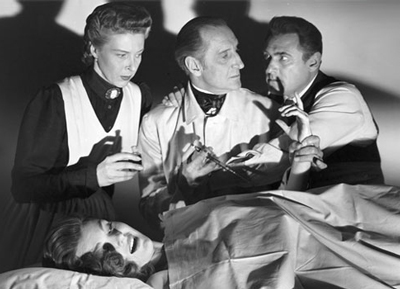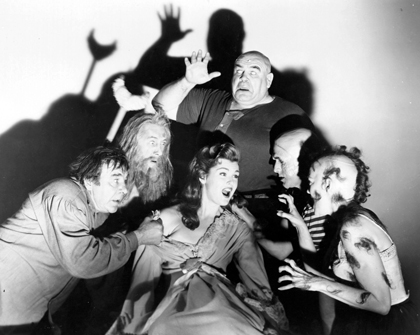
 |
|
|
|
Horror film fans are especially covetous of films that remain hard-to-see, and 1956's The Black Sleep was once high on the list of out-of-reach chillers. When we were in grade school, a definite pang of disappointment accompanied the realization that we'd finally caught up with all of the big Universal horror movies on television airings, and The Black Sleep looked very much like a continuation of the spirit of mad doctors and hideous mutants hidden in dank castle crypts. For years we saw tantalizing photos in Famous Monsters magazine featuring a whole gallery of horror stars: Lon Chaney Jr., John Carradine, Bela Lugosi, Tor Johnson. I can't say I knew who Akim Tamiroff was at the time, but everyone respected Basil Rathbone as Sherlock Holmes. His presence always gave a movie class. 
I didn't catch up with The Black Sleep until way later in life, in the early 1990s when I had access to the MGM/UA video library. I made the time to watch a vaulted videocassette -- and found out why I'd heard only a few random recommendations for the movie. I nearly fell asleep watching. A few hours later I had a hard time remembering more than a few story details. The movie made no lasting impression. Seeing the new MGM Limited Edition Collection disc of The Black Sleep pretty much supports my initial thoughts. This is a movie that should have a lot going for it ... a creepy story idea, a great cast and some fairly gruesome scenes at a time when almost no gothic-style horror films were being made anywhere. One year later, Hammer Films of England would singlehandedly ignite a worldwide horror Renaissance. The Black Sleep was made by industry notables Aubrey Schenck and Howard W. Koch, producers of note from the 1940s on; Koch became a prolific producer of mainstream hits in the 1970s. They formed a company called Bel-Air that turned out a busy run of low-budget product through United Artists in the 1950s. Their screenwriter John C. Higgins was responsible for the scripts for fine noir fare like T-Men, Raw Deal and Shield for Murder, as well as the story for the obscure but excellent wartime superspy film Sabotage Agent (The Adventures of Tartu). Their director was the veteran Reginald LeBorg, who started with musical short subjects in the thirties and graduated to some of the cheaper Universal chillers of the 40s. The Black Sleep's commercial hook is its star cast -- the print advertising and original trailer (included on MGM's disc) stressed the lineup of horror names. Only when the movie unspools do we realize that most of these icons are way past their prime. When some of these favorites show up only for brief walk-ons, we feel cheated. 
Surgeon Dr. Ramsay (Herbert Rudley of Decoy) is accused of a murder he didn't commit and sentenced to hang. Before the execution can be carried out he is given the exotic Indian drug "Nind Andhera", a.k.a. "The Black Sleep" by the renowned Sir Joel Cadman (Basil Rathbone). Ramsay wakes up a day later in Cadman's care. He's now officially dead, as the drug has convinced the authorities that he died of a heart attack. Cadman spirits Ramsay off to his mansion-laboratory, and enlists him as a surgical assistant for his radical, morally questionable brain experiments. Cadman's aim to map the brain and use his knowledge to cure the effects of physical damage and mental illness is laudable, but his attitude is decidedly sinister: taking a few human lives here and there is a regrettable necessity in his noble quest. We soon discover that Cadman's real aim is to learn enough from his brain surgery to cure his comatose wife, Angelina. Ramsay does his best to see things from Cadman's point of view but changes his mind when he realizes the full extent of the Doctor's cruel schemes. The very first experimental subject ends up a functioning moron, joining a growing collection of monsters in Cadman's cellar. Nurse Laurie (Patricia Blake [Blair] of City of Fear) begs for Ramsay's help, as Cadman has turned her father Dr. Monroe (Lon Chaney Jr.) into a mindless brute, now called Mungo. When Ramsay sees the cellar monstrosities for himself, Dr. Cadman forces him to operate on the next involuntary patient: Nurse Laurie. Koch and Schenck can't horror films their forte, as their later Frankenstein 1970 wastes the presence of Boris Karloff and their likewise Karloff-starring Voodoo Island is one of the most soporific horror pictures of the 1950s. A look at The Black Sleep's detailed synopsis reveals that screenwriter Higgins has created an intriguing sequence of events, but the film's weak execution drains all excitement from the story. The Black Sleep is far too talky, with almost every scene taking place in an enclosed, small space. The overall sameness to the settings and the lack of story pacing combine to make the show feel sluggish and shapeless. Rathbone carries his part well enough but once his reckless philosophy has been revealed, we learn nothing new about him. Akim Tamiroff is fairly congenial as Cadman's murderous gypsy henchman, the tattooist Odo, but his character is not well integrated into the storyline. We're told that the role was originally intended for Peter Lorre, who wouldn't have been able to do much with it either. What's lacking is a genuine sense of menace. Herbert Rudley isn't attractive enough or interesting enough to generate much interest as the involuntary addition to Cadman's castle of freaks. Here's one case where a movie really needed an actor with youth appeal: why not a compromised medical student, like one of Peter Cushing's assistants in Hammer's Frankenstein series? 1 
Lon Chaney Jr.'s Mungo lumbers about as a somewhat laughable menace, trying to strangle his own daughter. The other nurse (Phyllis Stanley) can control him with a simple admonition, but we don't understand why such a dangerous man would be allowed to roam about in the first place. Most of the rest of the film's "monsters" stay locked up in the cellar until the final scene. John Carradine plays a colorful wild man with a long beard, but is barely on screen for a minute. The other brain-damaged unfortunates are more pitiful than frightening, and push the movie in the same tasteless direction as the next year's chiller The Unearthly. One monstrosity is a madwoman with half of her head shaved bald. She wears only a slip, and is a sordid sight. It's interesting that, of the all monster men, the relative newcomer ghoul Tor Johnson makes the best impression. The baleful, hulking Johnson does little more than stand and stare with his dead eyes and contorted mouth, but he's a new and refreshing presence. This brings us to Bela Lugosi. This was Bela's final feature film; he passed away a few months after its release. Those of us familiar with The Body Snatcher had been disappointed to see Lugosi given such a small role, but his butler Casimir The Black Sleep is barely a presence. Lugosi just shambles around opening doors and giving not-always appropriate doubletakes to various other characters. Since he's playing a deaf mute, he doesn't even speak. He looks tired and not a little disoriented. It's not a happy thing to see. This makes the trailer for The Black Sleep seem all the more of a cheat, as it too promises a monster rally that never materializes. United Artists released the picture as a second feature to The Creeping Unknown, a re-titling of the superb English science fiction thriller The Quatermass Xperiment. The Black Sleep was itself re-titled Dr. Cadman's Secret for a 1962 re-issue. 
Horror fans will still want to see The Black Sleep and enough of them will like it enough to be amused. For some reason, it's always been one of those pictures that makes this reviewer feel sleepy ... this is the first time I've seen it all in one go. The MGM Limited Edition DVD of The Black Sleep is a good but not great encoding of this B&W horror offering. The picture was clearly meant to be matted to 1:66 (the titles form a horizontal stripe through the frame) but MGM is using a slightly older flat transfer. The cinematography is adequate but nothing special. Les Baxter's music adds emphasis to scenes not particularly well directed. The disc contains a nicely structured original trailer. If you Google "The Black Sleep Images" you'll find quite a few still photos that are more impressive than anything in the movie.
On a scale of Excellent, Good, Fair, and Poor,
The Black Sleep rates:
Footnotes:
1. This is actually a second go-around for actor Rudley and death-oriented drugs. In 1946's Decoy he plays a doctor who revives an executed gangster with a drug called Methylene Blue. Dr. Cadman's Black Sleep drug Nind Andhera is supposed to be an obscure mystery potion from India. He uses it as an anesthetic for operations (or vivisection experiments, if you will) but it sounds like something that belongs in a serial or a comic strip. The drug comes with an antidote that must be administered within ten hours. Any Mario Bava fan will agree that Nind Andhera has a lot in common with the Tibetan drug called "Cru-Shon" in Diabolik, which allows the nefarious criminal mastermind to fake his own death for 24 hours. Diabolik's lover Eva gives him the revival antidote with minutes to spare.
Reviews on the Savant main site have additional credits information and are often updated and annotated with reader input and graphics. Also, don't forget the 2010 Savant Wish List. T'was Ever Thus.
Review Staff | About DVD Talk | Newsletter Subscribe | Join DVD Talk Forum |
| ||||||||||||||||||